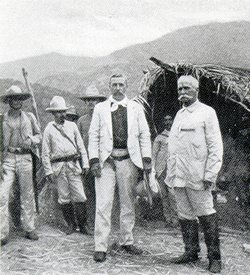{{ Update: you can now get the audio book here: Think and Grow Rich Audio Book }}
 I have been reading my way through a number of classic motivational books and have recently read the grand-daddy of them all, Think and Grow Rich, by Napolean Hill. I recall seeing this particular book on my maternal grandfather’s bookshelf when I was young. I never gave it much thought because the title didn’t appeal to me, but I decided to read it a few months ago. I really wish I had read it 30 years ago.
I have been reading my way through a number of classic motivational books and have recently read the grand-daddy of them all, Think and Grow Rich, by Napolean Hill. I recall seeing this particular book on my maternal grandfather’s bookshelf when I was young. I never gave it much thought because the title didn’t appeal to me, but I decided to read it a few months ago. I really wish I had read it 30 years ago.
I have decided to record Think and Grow Rich as an audiobook, using the original text, and provide it as a free download. I have several reasons for this:
- Firstly, I believe this book is hugely important for those who read and apply the principles that Napolean Hill suggests.
- Secondly, I believe this should be free, as in free speech and free beer. There are audiobook versions available with updated content, but they come at a cost. I believe that this should free and available to everyone who can access the Internet. The only way to do it is to read from the original text, which is in the public domain.
- Finally, I want to get some experience in desktop recording and audio post-processing, for various podcasts that I am planning.
I will probably begin recording next week and hope to have this published by the end of the year. I will offer it here, as a free download. I will likely publish this on the Internet Archive and LibriVox as well, which will make it available to the largest audience possible. If you would like to be notified when it is available for download, go to our contact page and send us a note with your email address and I’ll be sure to send an email when it is available.
For those who are interested, here is my recording kit:
Hardware:
- Yeti USB microphone – http://www.bluemic.com/yeti/
- Lenovo S10-3 Netbook – circa 2010
Software:
- PromptCast – Open Source teleprompter
- Audacity – Open Source audio recording, editing, and processing
Why a netbook? I am using a netbook primarily because it is portable, lightweight, handles audio recording perfectly, and I have one available for use. I plan to record while I travel, so I want a kit that I can carry in a small bag and take anywhere, without encumbering my daily laptop with the chore of recording. The small profile of the netbook makes it easy to setup anywhere. The microphone weighs more than the netbook! 😀
___________________
** Update **
Due to some difficulties in recording while traveling, specifically ambient noise, as well as a couple of seasonal colds, it is taking me a bit longer to record this. I am looking at having this completed by January 21st, 2013, Martin Luther King day.




